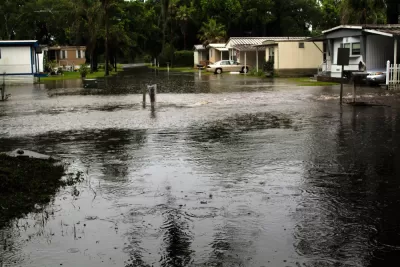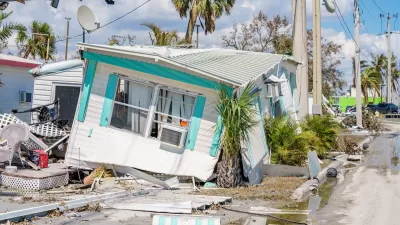A key supply of low-cost housing is under threat from extreme weather, rising sea levels, and other impacts of climate change.

Manufactured housing, often described as mobile homes (despite the high cost of relocation for these units), offers some of the most affordable housing in many parts of the country.
But with climate disasters posing growing threats to residential communities, manufactured home residents face some of the highest risks, writes Sarah Amandolare in Nexus Media News. “Across the U.S., biased zoning has sited many manufactured housing communities in precarious ‘fringe environments,’ such as floodplains and fire-prone urban edges, according to Zachary Lamb, a climate adaptation researcher at UC Berkeley.”
As Amandolare explains, climate change is now causing more destructive weather events in these areas, forcing communities to find ways to keep residents safe or relocate without raising the cost of living. A Vermont program in the Tri-Park Cooperative, a resident-owned mobile home community, could provide a new model for assisting homeowners with relocation. “Tri-Park residents each pay the same monthly rent to the co-op for their lot – an amount that won’t change for those who relocate – and the cost of their new homes will be covered by Vermont’s new Flood Resilient Communities Fund, rather than FEMA.” The program is administered by Vermont Emergency Management and was allocated $14.75 million by the state in 2022.
FULL STORY: Mobile Homes Offer Low-Cost Living. Now, They’re Threatened by Climate Change.

Planetizen Federal Action Tracker
A weekly monitor of how Trump’s orders and actions are impacting planners and planning in America.

San Francisco's School District Spent $105M To Build Affordable Housing for Teachers — And That's Just the Beginning
SFUSD joins a growing list of school districts using their land holdings to address housing affordability challenges faced by their own employees.

The Tiny, Adorable $7,000 Car Turning Japan Onto EVs
The single seat Mibot charges from a regular plug as quickly as an iPad, and is about half the price of an average EV.

As Trump Phases Out FEMA, Is It Time to Flee the Floodplains?
With less federal funding available for disaster relief efforts, the need to relocate at-risk communities is more urgent than ever.

With Protected Lanes, 460% More People Commute by Bike
For those needing more ammo, more data proving what we already knew is here.

In More Metros Than You’d Think, Suburbs are Now More Expensive Than the City
If you're moving to the burbs to save on square footage, data shows you should think again.
Urban Design for Planners 1: Software Tools
This six-course series explores essential urban design concepts using open source software and equips planners with the tools they need to participate fully in the urban design process.
Planning for Universal Design
Learn the tools for implementing Universal Design in planning regulations.
Smith Gee Studio
City of Charlotte
City of Camden Redevelopment Agency
City of Astoria
Transportation Research & Education Center (TREC) at Portland State University
US High Speed Rail Association
City of Camden Redevelopment Agency
Municipality of Princeton (NJ)





























